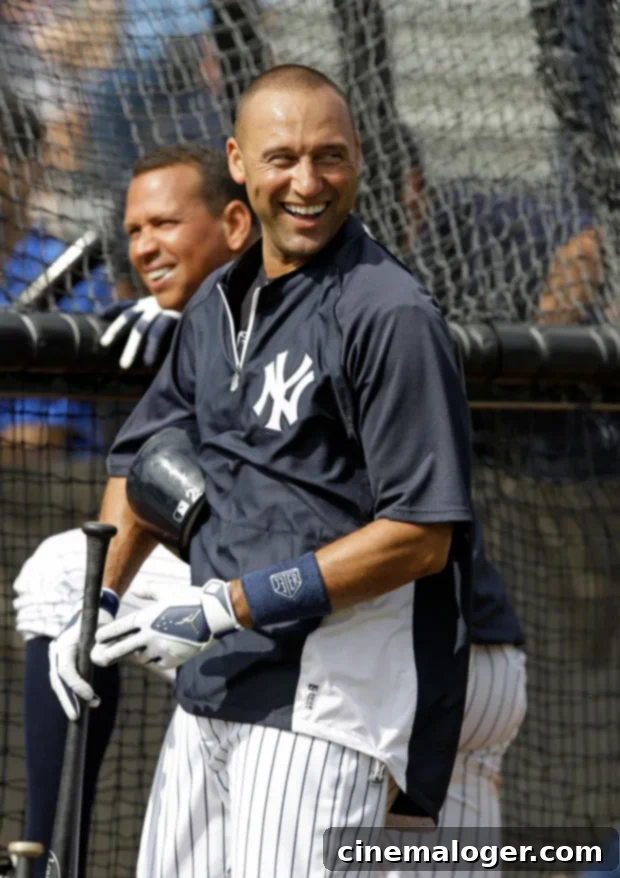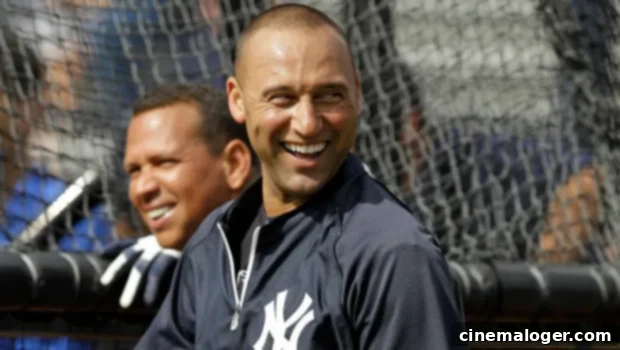Derek Jeter Breaks Silence: Unpacking His Complex Friendship with Alex Rodriguez in ‘The Captain’ Documentary
In a candid revelation that has captivated the baseball world, legendary New York Yankees captain Derek Jeter recently addressed the long-standing speculation surrounding his relationship with former teammate and fellow superstar Alex Rodriguez. While promoting his highly anticipated ESPN documentary, The Captain, Jeter offered a fresh perspective on their bond, particularly in light of comments he made within the documentary that suggested A-Rod was not a “true friend.” This public discourse has provided fans and critics alike with a rare glimpse into the complex dynamics that can unfold even among the most celebrated athletes.
The conversation took center stage during an interview with Good Day New York on Thursday, July 28, where Jeter unequivocally stated that any perceived “bad blood” between him and Rodriguez has long since dissipated. His remarks come after a scene in The Captain brought their past tensions back into the spotlight, specifically highlighting Jeter’s discomfort with previous statements made by A-Rod. Despite the documentary’s portrayal of their fractured friendship, Jeter confirmed that lines of communication have been open, signaling a move towards mutual understanding and respect.
When pressed by the interviewer about their current standing, the iconic shortstop responded with a reassuring clarity. “We’ve spoken. There is no wedge. Everything’s good,” he explained, emphasizing the reconciliation. “There are no issues between Alex and I, at all.” This assertion aims to put to rest years of media speculation and fan theories about the true nature of their relationship, offering a sense of closure to a narrative that has followed both players throughout their illustrious careers and into retirement.
The Genesis of a Rift: Unpacking the Controversial Comments
The core of the perceived rift, as illuminated in the new ESPN documentary, dates back to an interview Alex Rodriguez gave to Esquire magazine. Derek Jeter, known for his unwavering loyalty and private nature, openly shared his feelings of betrayal regarding A-Rod’s remarks. “As a friend, I’m loyal. I just looked at it as, ‘I wouldn’t have done it.’ And then it was the media. The constant hammer to the nail. They just kept hammering it in. It just became noise, which frustrated me,” he recounted in the documentary, as reported by The New York Post. “It goes back to the trust, the loyalty. This is how the guy feels. He’s not a true friend, is how I felt. Because I wouldn’t do it to a friend.” These powerful words underscore the depth of Jeter’s emotional response and the personal impact of A-Rod’s perceived slight.

The specific comments from A-Rod that drew Jeter’s ire revolved around Alex’s assessment of Derek’s batting prowess and overall contribution. The Hall-of-Famer felt that his teammate had “diminished” his ability, particularly in the context of the Yankees’ lineup. During the controversial Esquire interview, Alex Rodriguez had remarked about Jeter hitting second in the lineup, stating, ”You never say, ‘Don’t let Derek beat you.’ That’s never your concern.” This comment, taken by many as an undermining of Jeter’s clutch hitting ability, was compounded by another, even more pointed remark in a similar interview where Alex boldly declared, “There’s not one thing he does better than me.” These statements, coming from a teammate and someone Jeter considered a friend, were perceived as a direct challenge to his integrity and leadership, deeply affecting him and sowing the seeds of discord.
A Shared Legacy and the Pressure of Stardom
The relationship between Derek Jeter and Alex Rodriguez began years before A-Rod joined the Yankees in 2004. Both were highly touted shortstops entering the league around the same time, quickly rising to superstardom. Their early careers were marked by a friendly rivalry, often celebrated in the media as the two best young shortstops in baseball. This burgeoning friendship, however, faced its ultimate test when Rodriguez was traded to the Yankees. The narrative shifted from rival shortstops to teammates, creating an unprecedented dynamic within the storied Yankees clubhouse. A-Rod’s move to third base was a necessary adjustment to accommodate Jeter, the entrenched captain and shortstop, a testament to the team’s hierarchy and the respect Jeter commanded.
The arrival of Alex Rodriguez was meant to solidify the Yankees’ dominance, bringing together two of the biggest names in the sport. Yet, it also brought immense scrutiny, not just on their performance but on their personal chemistry. The media, ever hungry for narratives, quickly picked up on any subtle tension, fanning the flames of a “rivalry” even when they were on the same side. This constant spotlight meant that any perceived slight, like A-Rod’s Esquire comments, would be magnified tenfold, turning private frustrations into public spectacles. Jeter’s reference to the media’s “constant hammer to the nail” perfectly encapsulates the relentless pressure and scrutiny they faced, which made resolving personal issues even more challenging.
For years, their relationship remained a topic of intense fascination. Fans debated whether the two truly got along, speculating on the true extent of their friendship, or lack thereof. The documentary The Captain provides Jeter’s long-awaited, unfiltered perspective, shedding light on the emotional toll these public discussions and private betrayals took. It reveals a side of Jeter rarely seen, one that acknowledges vulnerability and the human cost of living under the perpetual glare of celebrity and professional expectations. His honesty in the documentary allowed viewers to understand the deep-seated values of loyalty and trust that guide his personal and professional life.
Alex Rodriguez’s Acknowledgment and the Path to Reconciliation
While Jeter’s pain was palpable, the documentary also offers a glimpse into Alex Rodriguez’s own reflections on the incident. After A-Rod clearly struck a nerve with the baseball legend, he did admit to feeling guilty about what he said and the way it was portrayed after the story was published. “When that came out, I felt really bad about it,” he confessed in the documentary. This acknowledgment from A-Rod is crucial, demonstrating that the gravity of his words and their impact on his friend were not lost on him, even if the realization came later. It speaks to the complexity of human relationships, where missteps can occur, and remorse can pave the way for understanding and eventual healing.
The passage of time often has a way of softening old wounds and providing new perspectives. Both Jeter and Rodriguez have transitioned from their playing days into new chapters of their lives, including roles as media personalities and businessmen. This evolution, coupled with maturity and a shared history, has likely contributed to their current ability to openly communicate and address past grievances. Jeter’s recent declaration that “there is no wedge” suggests that personal conversations, perhaps facilitated by the documentary production itself, have allowed them to bridge the gap that once seemed insurmountable.

The Significance of Their Evolving Relationship
For baseball fans, particularly those who followed the Yankees during the Jeter-Rodriguez era, this update is more than just celebrity gossip; it’s a piece of closure regarding two figures who defined an era. Their dynamic, often fraught with tension, represented the challenges of balancing individual ambition with team unity. Jeter’s confirmation of their mended relationship offers a powerful lesson in forgiveness and the possibility of moving past deeply rooted conflicts. It also reinforces the idea that even legendary athletes, revered for their on-field heroics, navigate complex human emotions and relationships.
The ESPN documentary The Captain serves as a pivotal platform for this narrative. By allowing Jeter to tell his story in his own words, it not only celebrates his illustrious career but also provides an intimate look at the personal struggles and triumphs behind the public persona. His decision to address the A-Rod situation directly and then subsequently confirm their reconciliation reflects a desire for honesty and a definitive end to years of speculation. It solidifies his legacy not just as an incredible athlete, but as a man who values trust, loyalty, and ultimately, understanding.
In conclusion, Derek Jeter’s recent statements about Alex Rodriguez mark a significant development in one of baseball’s most enduring and fascinating personal sagas. From initial friendship to a publicized rift fueled by controversial comments and media amplification, their journey reflects the unique pressures faced by professional athletes. The revelation in The Captain, followed by Jeter’s reassuring update on Good Day New York, underscores a matured perspective and a willingness to acknowledge past issues while fostering current peace. This evolution in their relationship serves as a testament to the enduring power of time, reflection, and perhaps, the shared bond forged on the diamond as New York Yankees legends.
